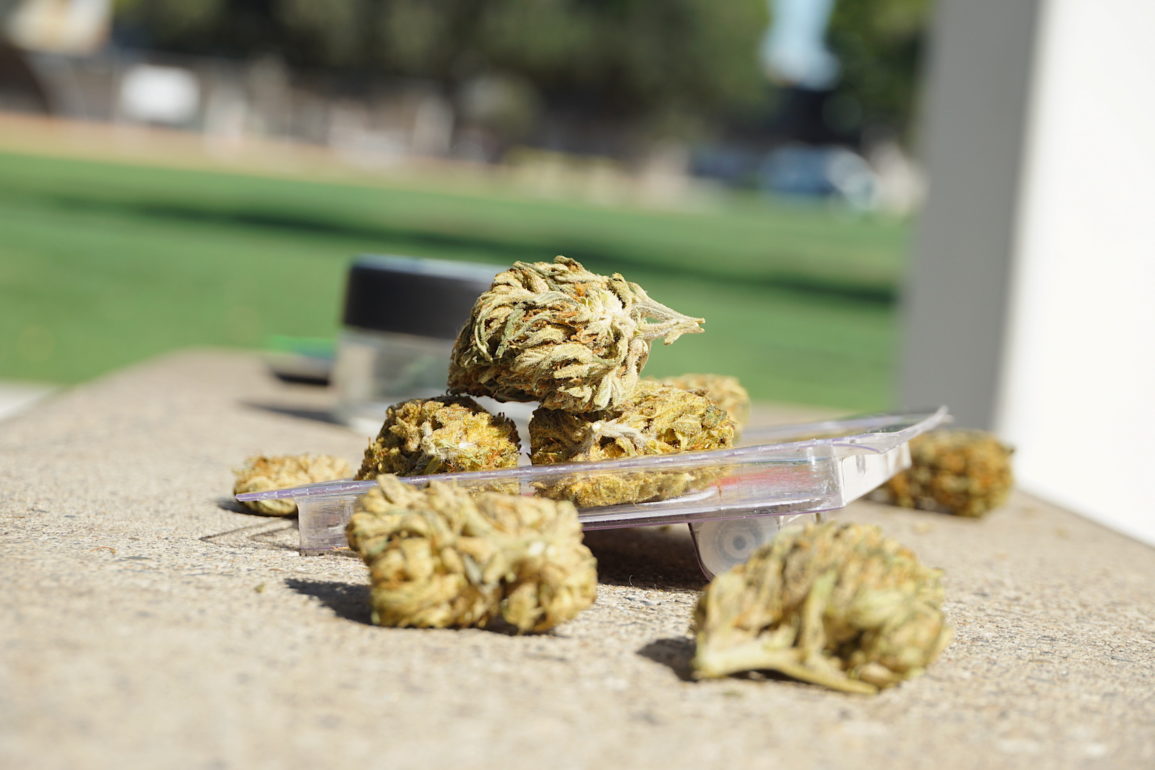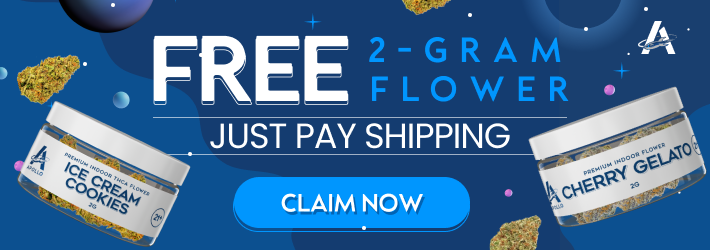On October 18th, CBD and vape stores rushed to pull delta-8 THC products off their shelves, after the Texas Department of State Health Services (DSHS) updated its website to label delta-8 THC illegal in the state. Despite failed attempts at bans in the legislature throughout the year in the 87th legislative session, the state officially updated its list of controlled substances to include all alternative forms of THC back in January. This has come as a shock to both consumers and most people in the industry, who believed delta-8 was legal across the country because of the language in the federal 2018 Farm Bill.
We wanted to find out how Texans felt about this change to the law, and regulations for delta-8 and delta-9 THC in general, and so we surveyed 500 Texans who’d at least heard of delta-8 on the topic. Overall, we found that 94% of them did not support the unilateral ban imposed by the DSHS.
Survey Highlights
- Participants: 500 Texas-based consumers who’d at least heard of delta-8 THC.
- Almost all supported legal access to delta-8: 94% supported some form of legal access, primarily recreational but around 27% saying medical use only.
- The majority were pro marijuana-legalization in some form: 52.8% thought marijuana should be legal for medical purposes and 39.6% thought it should be legal for recreational use.
- Some said they will switch to black market weed or other drugs if the ban continues: Around a third would switch to black market marijuana if the ban was made permanent, and around one in six would switch to harder drugs.
- Both Repulicans and Democrats support delta-8 access: There was support for delta-8 across the political spectrum, although slightly stronger for democrats.
- Younger men were the most likely to switch to street drugs if the ban continues: Both men and Millennials were more likely than women to say they’d switch to harder drugs or black market marijuana if the ban was permanent.
Table of Contents
Should Delta-8 THC Be Legal in Texas?
Should Marijuana Be Legal in Texas?
If Delta-8 is Permanently Banned, Would People Substitute Other Substances?
Which Products Have You Used for Medical or Recreational Purposes?
Democrats are More Likely to Support Marijuana Legalization, but Both are in Favor
Democrats are Stronger Supporters of Unrestricted Delta-8 Use
Younger People Are More Liberal About Delta-8 Use
Men are Slightly More Likely to Support Personal Delta-8 Use, Women Medicinal
Higher Income People are More Likely to Support Medical Delta-8 Use, Lower Income Any Use
Millennials Are Most Likely to Turn to the Black Market or Harder Drugs in the Event of a Ban
Men are More Likely to Substitute Delta-8 with Harder Drugs or Black Market Weed
Higher-Income People Are Most Likely to Switch to Harder Drugs
Background
The legality of delta-8 THC in Texas is a confusing topic. Essentially, the state imported the definitions and regulations from the 2018 Farm Bill into state legislature throughout 2019. These regulations weren’t really created with delta-8 in mind. However, it does remove hemp (also defined by the bill) and THCs contained within hemp from the controlled substances list, provided they contain less than 0.3% delta-9 THC. This is generally why CBD is federally legal if it meets with this restriction. But since delta-8 is contained within the hemp plant and finished products contain (at least allegedly) less than 0.3% delta-9, many people argue that this makes delta-8 legal at the federal level too.
But back in August 2020, the DEA issued an Interim Final Rule (IFR) which adopted the changes instituted in the Farm Bill. A month later, the Texas DSHS issued a Notice of Objection to these proposed changes, and after a completely empty “public” hearing on the topic, a decision was signed by DSHS commissioner Hellerstedt in November and in January, the decision order was published in the Texas Register. Many people argue that delta-8 has been illegal in Texas from this date onwards, despite no action being taken until long afterwards, and in fact no industry stakeholders being aware of this until mid-May. There is more detail in the legal challenge document from Hometown Hero.
Summary of Findings: What Do Texans Think About the Delta-8 THC Ban?
Should Delta-8 THC Be Legal in Texas?
The main result from the survey addresses Texans’ views on the delta-8 THC ban in the state, and whether they think it should be legal for adult use or medical use. The results show that of the 500 people surveyed, 45% believe delta-8 should be legal for any use (with no restriction on amount), another 22.2% believe it should be legal in small amounts for any purpose, and another 27.2% say it should be legal for medical purposes. This leaves just 5.6% who believe it should be totally illegal as is currently the case, with over 94% disagreeing.

Should Marijuana Be Legal in Texas?
In contrast, 52.8% of respondents think that marijuana (i.e. delta-9 THC containing weed) should be legal for medical use and 39.6% think it should be legal for adult/recreational use. This leaves just 7.6% of respondents who believe that marijuana should not be legal for any purpose. In contrast to our survey, other Texas-based surveys put the percentage thinking marijuana should not be legal for any purposes at 13%. This reflects our survey design: we were looking for people who have at least heard of delta-8, and as such it skews more heavily towards people who have used marijuana in the past.

If Delta-8 is Permanently Banned, Would People Substitute Other Substances?
One concern with any prohibition is the creation of black markets, and for substances, substitution with other, more easily obtained substances. We asked the respondents whether they would use any of a list of substances instead of delta-8 in the case of a permanent ban. Overall, medical marijuana was the most common answer, with 48.2% of respondents saying they would use it instead in the event of a ban. This might not seem like a huge deal, but it’s worth noting that delta-8 is widely considered to be a “lighter” form of marijuana with less intense effects and fewer side effects, so in a sense users would move up in potency.
The next most-common answer was (THC-free) hemp CBD products, which 37% said they would use instead, followed by black market marijuana which 33.2% would use instead. Prescription medications and opioids were the next choice of the respondents, with 31.6% saying they would substitute them, and 29.8% said they’d use over-the-counter medications instead. The remaining options were less common but more concerning: 23.8% would substitute tobacco, 16.4% would use harder drugs and 11.4% would use kratom. 4% chose “other,” with most writing in “nothing” (or equivalent) and one responding “alcohol.”

Expanded Summary of the Survey Results
The basic results above give the general picture from the survey, particularly as it relates to delta-8. But we asked a little more in the course of the survey, and some of the results can be used to look for differences that depend on demographics or other factors like political affiliation.
Which Products Have You Used for Medical or Recreational Purposes?
We asked about general familiarity with various related substances as part of the survey, and really this underlines the fact that our sample skews more heavily towards cannabis users than the general population. We found that 70% of respondents had used cannabis, 55.2% had used delta-8, 50.4% had used hemp CBD, 16.6% had used kratom and 17.2% had used other legal highs. For medications, 46.6% had used prescribed medications, 37.4% had used over-the-counter medications and 32.4% had used herbal medications. Finally 41% had used tobacco and 5% hadn’t used any of the above substances.

Democrats are More Likely to Support Marijuana Legalization, but Both are in Favor
When the results are broken down by political party, the survey shows stronger support for legalization overall among democrats, but most republicans support some form of legalization too. Overall, 7.3% of democrats completely opposed marijuana legalization, compared to 8% of republicans, with 60.5% of democrats choosing legal for medical use and 32.3% choosing legal for adult use. For republicans, 47% chose legal for medical use and 44.9% chose legal for adult use. Overall this shows broad support for cannabis use but democrats swaying more towards medical use and republicans towards recreational use.
Democrats are Stronger Supporters of Unrestricted Delta-8 Use
When asked about their views on delta-8 use and the law, democrats were much more likely to support the legality of any amount of delta-8 for any purpose, with 48.6% being in favor compared to 36% of republicans. For smaller, personal use amounts only, 20.9% of democrats were in favor compared to 25% of republicans. Combining these results (since you could only choose one), 69.6% of democrats supported some form of personal use legalization compared to 61% of republicans. For medical use (again, noting only one could be chosen), 25.5% of democrats were in favor compared to 32.4% of republicans. Again, republicans were slightly more likely to oppose all delta-8 THC use, with 6.6% of republicans being completely against it compared to 5% of democrats.


Overall this shows that democrats are generally more permissive of delta-8, but most republicans would support it in some form, albeit shifted a little more towards medical use.
Younger People Are More Liberal About Delta-8 Use
When the results are broken down by age group, it shows that younger people are generally more supportive of delta-8 being legal, although the vast majority of all age groups are in support. For instance, 54.9% of 25 to 34 year olds supported delta-8 being legal in any amount for any purpose, compared to 32.4% of those aged 54 or older. Although around 37.3% of them supported unrestricted use, 45 to 54 year olds were the most likely to support legality in small amounts for personal use, with 32.2% opting for this choice. On the other end of the scale, those aged over 54 were the most likely to support it only in medical settings (32.4%) and to oppose it regardless of approach (8.8%).
Men are Slightly More Likely to Support Personal Delta-8 Use, Women Medicinal
While the results don’t differ too much by gender, men do appear to support recreational use slightly more than women, and in turn women are slightly more likely to draw the line at medical use. Overall, 45.2% of men supported delta-8 being legal with no restrictions, and another 24.2% supported it with limits on quantity, compared to 44.8% and 20.2% for women, respectively. For medical use, 29.8% of women chose this as the limit for legality compared to 24.6% of men. However, it is worth underlining again that the differences by gender were very limited.
Higher Income People are More Likely to Support Medical Delta-8 Use, Lower Income Any Use
If the results are broken down by income level, they show that – despite a lot of similarities – there are some distinct differences in views.
For example, lower income people were the most supportive of unrestricted delta-8 use, with 50.5% of the lowest-income bracket and 53.4% of the next-lowest bracket being supportive, compared to (for example), 28.2% of the second-highest income group.
Those with higher incomes were the most likely to limit their support to medical purposes, with 38.5% of the second-highest and 37.5% of the highest-income group choosing this option, compared to about 21.6% of both lower-income groups.
For the middle income families, the most stand-out results were their support for legality in personal use amounts, with 32.8% supporting this compared to 14.6% of the highest-income group (although you should note that most middle income respondents favored unrestricted use). 10.3% of the upper middle group was also opposed to delta-8 legality in any form, which was well above any other group aside from the lowest-income group (of whom 9.9% were totally opposed).
Millennials Are Most Likely to Turn to the Black Market or Harder Drugs in the Event of a Ban
When asked about what they would do if the ban was permanent, the results show that millennials are the most likely group to turn to either black market marijuana or harder drugs, while older groups skew towards medical alternatives. Those aged 25 to 34 were most likely to say they’d shift to harder drugs, with 22.6% giving this response (compared to 17.7% of those older than 54 or 27.7% of 18 to 24 year olds, for example), and 39.1% said they’d shift to black market marijuana (compared to 32.4% of the oldest group and 25.3% of the youngest).
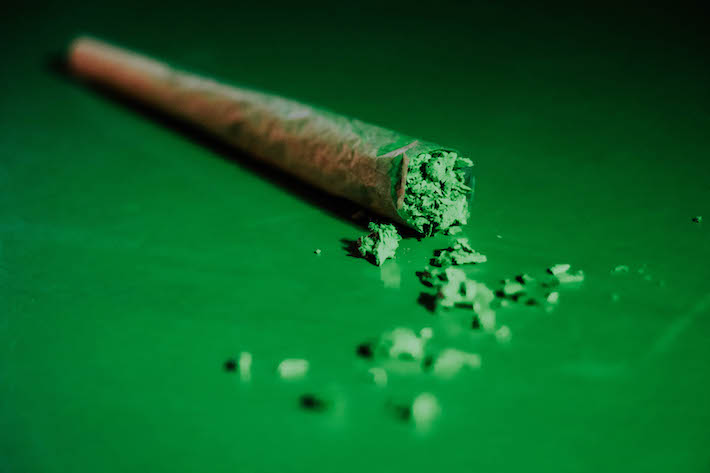
In contrast, older respondents were more likely to choose medical alternatives. For example, 52.4% of 35 to 44 year olds said they would switch to medical marijuana in the event of a ban (although 49.4% of the youngest group also said this), and 35.6% said they’d switch to prescription medications or opioids, compared to 21.7% of the youngest age group. Similarly, the oldest age group were the most likely to substitute with over-the-counter medications, with 50% choosing this option compared to 19.3% of the younger group.
This really reflects the reasons the groups use delta-8: young people are more likely to do so recreationally, while older people are more likely to do so medicinally. However, there is significant overlap here.
Men are More Likely to Substitute Delta-8 with Harder Drugs or Black Market Weed
The results, broken down by gender, show some substantial differences in how the respondents would choose to substitute delta-8 in the event of a permanent ban. Most concerning is the finding that 20.6% of men would choose harder drugs, compared to 12.1% of women. Additionally, 37.7% of men would switch to black market marijuana, compared to 28.6% of women. There is also a substantial difference in the number who’d switch to medical marijuana (57.9% of men vs. 38.3% of women), tobacco (30.6% of men vs. 16.9% of women) and kratom (16.3% of men vs. 6.5% of women).
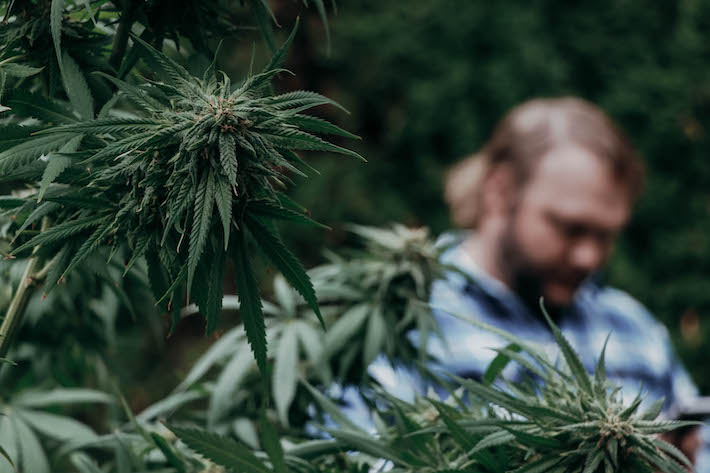
The only thing women were more likely to switch to was over-the-counter medications, and the difference there was pretty small (31.9% of women vs. 27.8% of men).
Higher-Income People Are Most Likely to Switch to Harder Drugs
A possibly surprising result is the finding that those with the highest incomes were most likely to say they’d switch to harder drugs if delta-8 was permanently banned. The results show that 30.8% of the highest-income group would switch to harder drugs, compared to 14.4% of the lowest-income group. Similarly, while 47.7% of the highest-income group would switch to black market marijuana, just 36% of the lowest-income group would do this. However, the most common answers from this group were switching to medical marijuana (69.2%) and switching to CBD products (60%). Generally speaking, lower-income people were less likely to switch to anything and lower and especially middle income people were much less likely to switch to harder drugs.
What This Means
Overall, the survey paints a pretty clear picture of Texans’ views on the delta-8 THC ban. Firstly, the vast majority of those surveyed (94%) were opposed to a unilateral ban of the sort currently in place. Over two-thirds of respondents (67.2%) support some form of recreational use law, with the remaining 27.2% thinking it should be legal for medicinal use. Although it’s clear from the marijuana-use rate of the sample and their views on legalization that this is a more permissive group than people in Texas as a whole, the differences in views on legalization are not huge, and it likely reflects a genuine opposition to the current laws.
The survey results also clearly show that many people who use delta-8 would simply switch to other substances if the ban was kept. Although the most common response was medical marijuana (about half of participants), there were a couple of more concerning results, including that 31.6% would switch to prescription medications (including opioids) and that 16.4% would switch to harder drugs. Additionally, about a third would switch to black market marijuana. This all begs the question: what would a ban achieve? Is having people using delta-9 THC purchased from a street corner dealer really better than having people using delta-8 from a local business? And what of the roughly one in six that would opt for harder drugs – is delta-8 really bad enough to justify this?
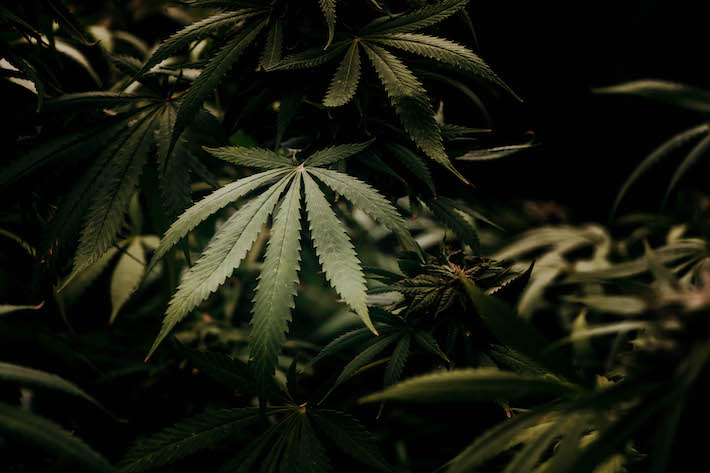
The lesson from the survey is really abundantly clear. Most Texans support some form of marijuana legalization, and given that delta-8 is a less intense form of the same basic thing, the vast majority support some form of legalization for that too. Throw in the standard consequences of prohibition (notably, substituting other substances that are often more dangerous) and the fact that the law was passed in an underhanded (if at all legitimate) way, and the big question is why? What imaginary problem are lawmakers attempting to solve? Businesses feel blindsided and consumers really don’t support the action at all anyway. Who is this benefiting, exactly?
Methodology: How the Survey Was Put Together
The survey was conducted on November 3, 2021, through Pollfish. This is a network that includes over a billion consumers worldwide, using what Pollfish calls Organic Sampling, built on a random device engagement framework. There is more detailed information on Pollfish’s website, but it basically uses partnered apps to send invitations to surveys which match the users’ interests and any specific demographic information when the user is engaged with the app.
In our case, this enabled us to sample 500 Texas-based consumers who were at least aware of delta-8 THC. While this means our survey respondents aren’t representative of Texas as a whole, it is representative of Texans with an interest in delta-8 THC.
Demographics of the Sample
There were 500 participants in total in the survey, and they can be broken down as follows (full survey spreadsheet available upon request):
Gender:
- 49.6% women
- 50.4% men
Ethnicity
- 58.2% white
- 17.2% Hispanic
- 14.4% black
- 3% Asian
- 2% multi-racial
- 1.4% Latino
- 1.8% other
- 2% preferred not to say
Education (highest level completed)
- 3% middle school
- 29.6% high school
- 33% university
- 23% postgraduate
- 11.4% vocational technical college
Household income
- 22.2% lower 1
- 17.6% lower 2
- 12.2% middle 1
- 11.6% middle 2
- 7.8% high 1
- 9.6% high 2
- 13% high 3
Marital status
- 28.4% single
- 48.8% married
- 12.4% living with partner
- 4.4% divorced
- 2.8% separated
- 2.4% preferred not to say
Age
- 16.6% aged 18 to 24
- 26.6% aged 25 to 34
- 38.2% aged 35 to 44
- 11.8% aged 45 to 54
- 6.8% aged over 54
Conclusion
Maintaining the ban on delta-8 THC in Texas would contradict the views of residents from across the political and socio-economic spectrum in the state. Our survey looked at a representative sample of people aware of delta-8 in the state and they all had relatively similar views on the issue. It also revealed that substantial numbers of people who use delta-8 would switch to black market sources of THC, acquire THC through the medical marijuana program anyway, or most concerning, switch to harder drugs instead. The big question raised by all of this is simple: why ban delta-8 at all rather than enacting sensible regulations on producers?
At present, the approach taken by the DSHS is favored by very few, and potentially harmful to many. They instituted the ban while putting little to no effort into getting the views of stakeholders, whether consumer or industry, and the reason appears pretty clear: nobody would really have wanted it and it’s incredibly difficult to justify in terms of risks vs. benefits.
